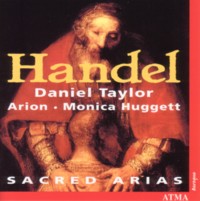Handel: Sacred Arias
ATMA Classique ACD2 2222
1 CD
full price
Recorded in 2000
Released in 2001
Saul (HWV 53):
Sinfonia
"O Lord, whose mercies numberless"
Messiah (HWV 56):
"But who may abide"
"If God be for us"
Concerto Grosso, Opus 3, Number 6: Allegro
Solomon (HWV 65):
Ouverture
"Almighty Pow'r"
"Bless'd be the Lord ... What though I trace"
Theodora (HWV 68):
Ouverture
"As with rosy steps"
Daniel Taylor (countertenor)
Arion (on period instruments)
Conductor: Monica Huggett, violin
Although this disc is titled "Sacred Arias" it is obvious that most of it is orchestral. Few of its featured arias are "sacred". Beyond that criticism, this disc is lovely. Clifford Bartlett's booklet essay explains that this recital is in fact a hypothetical 18th century concert, featuring arrangements of overtures for the available forces and popular oratorio airs. This explains why the Sinfonia from Saul is treated rather like a double violin concerto, with the organ solo replaced by Monica Huggett's flamboyant solos in the third movement. One would not want to hear a performance like this in the context of the entire oratorio, yet it works perfectly well as a concert item.
Daniel Taylor's sensitive interpretation of "O Lord, whose mercies numberless" makes one fervently desire a complete recording of Saul of such quality. Taylor's lyrical approach is appropriately modest and understated, and it even surpasses recent efforts by both Scholl and Daniels. One really feels that Taylor understands this music, and is communicating the humble yet gifted David's attempts to placate Saul's rage. Top marks must also be awarded to the record company and performers for including the subsequent harp solo (recitals by James Bowman and David Daniels both omit it - when will musicians realise that this aria without its harp solo is like playing tennis without a net?).
The remainder of the orchestral items are equally intelligent, with an especially vibrant performance of the opening allegro from Opus 3 number 6. Taylor's singing is constantly a pleasure to listen to. He is easily the most underrated of all the current crop of star countertenors, and his wise musicianship abounds in each of his few arias. "But who may abide" is exciting, while "If God be for us" presents a far more relaxed mood. "What though I trace" from Solomon is magical stuff, and presents another direct comparison with Scholl (who sings the aria on Paul McCreesh's complete Solomon). For this critic, Taylor emerges from the contest as the comfortable winner time and time again. The only weak spot is Irene's "As with rosy steps" from Theodora. Taylor sings it beautifully, but this serene aria composed for a female contralto character sounds exposed and does not really suit countertenor interpretation.
It is a pity that we have not yet been blessed with a full Handel recital from Daniel Taylor, yet in some ways I prefer this kind of mixed programme to the relentless vocal overkill typified by the recent oratorio arias disc by David Daniels. Despite an over-reliance on the excellent ensemble Arion, hearing these arias in the context of some other compositions is an attractive concept, and this imaginative and enjoyable disc will fill the void very nicely for now.

© David Vickers - September 2002
